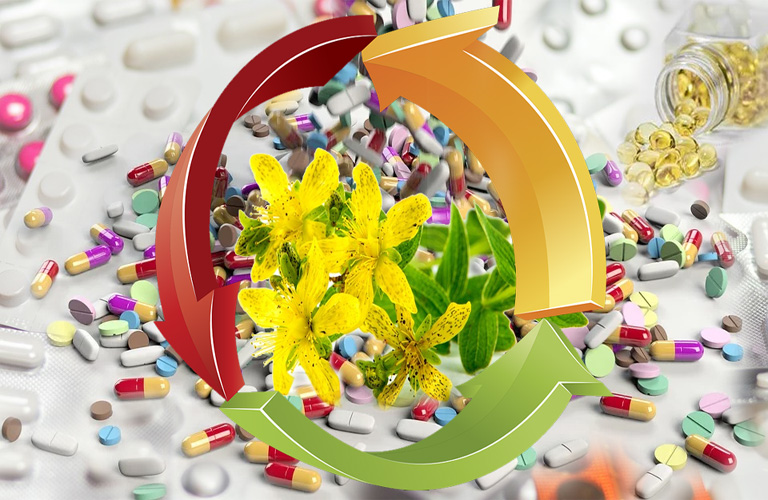St. John's Wort Interactions
Popular herbal supplement St. John’s wort is especially well known for decreasing the effects of many types of drugs. It does this by speeding up the processes in your body that change drugs into inactive substances. This herb may decrease the effectiveness of more than 70 percent of all drugs.
Some Drugs That Interact With St. John’s Wort:
- Anesthetics
- Anti-anxiety drugs
- Anticoagulants (blood thinners)
- Antidepressants
- Cancer drugs
- Cholesterol-lowering drugs (statins)
- Diabetes drugs
- Digoxin (digitalis), a drug used to treat heart problems
- Drugs that suppress the immune system (used to prevent rejection of transplanted organs)
- Drugs used to prevent seizures
- Drugs used to treat HIV infection
- Fexofenadine (an antihistamine)
- Finasteride (a drug used for prostate problems)
- Ivabradine (a drug used to treat angina)
- Methadone
- Nifedipine and verapamil (used to treat high blood pressure or heart problems)
- Omeprazole (an acid reducer used to treat digestive tract problems)
- Oral contraceptives (birth control pills)
- Talinolol (a beta-blocker used for high blood pressure and heart problems)
- Theophylline (an asthma drug)
- Voriconazole (a drug used to treat fungal infections)
Browse Pages:

St. John's wort (Hypericum perforatum): This herb is considered an inducer of liver enzymes, which means it can reduce the concentration of medications in the blood. St. John's wort can reduce the blood level of medications such as Lanoxin, the cholesterol-lowering drugs Mevacor and Altocor (lovastatin), and the erectile dysfunction drug Viagra (sildenafil).
St. John’s wort can decrease the effectiveness of birth control pills, leading to breakthrough bleeding and an increased risk of unintended pregnancy.
St. John’s wort also interacts with some drugs in other ways. For example, taking St. John’s wort with certain types of antidepressants can cause harmful side effects.
If you’re considering taking an over-the-counter drug, prescription medications, and a dietary supplement, it’s a good idea to talk with your health care provider or a pharmacist about possible interactions.
It’s important to tell your health care providers about all the drugs and supplements you take.
What You Should Know
Some interactions between supplements and drugs are very dangerous. For example, interactions can decrease the effectiveness of critically important drugs—such as drugs that prevent transplanted organs from being rejected.
Some supplements can increase the effects—including unwanted side effects—of drugs. For example, herbs that decrease blood sugar may interact with anti-diabetes drugs to cause blood sugar to drop too far.
Sometimes, taking a drug and a supplement together may decrease the drug’s effects. This means that you aren’t getting the full benefit from the drug that your health care provider wants you to have. For example popular herbal supplement St. John’s wort is especially well known for decreasing the effects of drugs.
Some supplements may increase the effects and side effects of drugs. For example, the herb schisandra may slow down the processes in your body that change drugs into inactive substances. So if you take this herb while you’re also taking a drug, the amount of the drug in your body may increase. As a result, the drug’s effects may be too strong.





